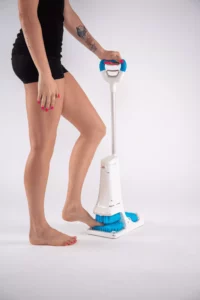The use of foot scrubbers is a common practice in foot hygiene, offering multitude benefits such as exfoliating dead skin and improving skin health. However, it is essential to ask the question, ‘Should foot scrubbers be avoided for certain foot conditions?’ This article will delve into this question, discussing the possible risks and benefits of using foot scrubbers, particularly for those with specific foot conditions.
The first section of this article provides an overview of different foot conditions, from common issues such as calluses and corns to more serious conditions like plantar fasciitis and diabetic foot ulcers. This will help readers understand the complexities of foot health and the importance of proper foot care.
The second section will explore the impact of foot scrubbers on various foot conditions. While foot scrubbers may contribute to foot health for some, they can potentially exacerbate existing foot conditions for others. This section will provide a detailed breakdown of these possible effects.
Following this, the article will discuss the potential risks of using foot scrubbers for certain conditions. It is crucial to understand that the improper use of foot scrubbers can lead to severe complications, especially for individuals with pre-existing foot conditions.
The fourth part of the article will share alternative foot care methods for sensitive or damaged feet. For those who cannot use foot scrubbers, this section will suggest other viable options to maintain foot health.
Lastly, the article will present expert opinions and recommendations on foot scrubbers usage. This will provide readers with professional advice and help them make informed decisions about if and how they should use foot scrubbers.
By providing a comprehensive discussion on this topic, this article aims to equip readers with the knowledge to make informed decisions about their foot care routine, reducing the risk of foot-related complications and promoting overall foot health.
Overview of Different Foot Conditions
Foot conditions vary widely, from minor annoyances such as corns and calluses to more severe conditions like plantar fasciitis, bunions, and neuropathic ulcers. Each of these conditions has unique characteristics and implications for foot health.
Corns and calluses, for instance, are thickened layers of skin that develop when your skin tries to protect itself against friction and pressure. They can be unattractive and uncomfortable, but they’re usually not a serious health issue.
On the other hand, plantar fasciitis is a more painful condition that involves inflammation of the thick band of tissue that runs across the bottom of your foot, connecting your heel bone to your toes. This condition can cause severe heel pain, making it difficult to walk or stand.
Bunions are another painful condition, characterized by a bony bump that forms on the joint at the base of your big toe. Bunions can cause significant discomfort and can even affect the shape of your foot.
Lastly, neuropathic ulcers are a severe foot condition commonly found in individuals with diabetes. These ulcers are areas of broken skin or sores on the foot that don’t heal or keep coming back, often because of nerve damage in the feet that reduces sensation.
Each of these foot conditions requires a different approach to care and treatment. Using a foot scrubber may not be suitable for all conditions, especially those that involve open sores or extreme sensitivity. It’s always best to consult with a healthcare provider or a foot care specialist when considering using a foot scrubber.
Impact of Foot Scrubbers on Various Foot Conditions
The impact of foot scrubbers on various foot conditions is a multifaceted topic. Foot scrubbers, often used to exfoliate the skin and remove dead cells, can sometimes cause more harm than good depending on the condition of the feet.
For people with normal, healthy feet, a foot scrubber can be beneficial in maintaining soft, smooth skin. It aids in the removal of calluses and rough patches, providing an overall enhancement to the foot’s appearance. This is especially beneficial for those who often have their feet exposed or wear footwear that necessitates smooth and well-kept feet.
However, for those with certain foot conditions, use of foot scrubbers must be cautiously considered. Conditions such as athlete’s foot, plantar warts, corns, and foot ulcers can be adversely affected by the use of foot scrubbers. The scrubbing action, while beneficial for removing dead skin cells on healthy skin, can potentially open up wounds or spread infections in these conditions.
For instance, if a person with athlete’s foot were to use a foot scrubber, they could unknowingly spread the fungus to other areas of the foot. Similarly, those with plantar warts could cause the virus to spread, increasing the number of warts.
In the case of corns and foot ulcers, scrubbing could create wounds and delay the healing process, increasing the risk of infection. Therefore, it is crucial for individuals with these conditions to consult with a healthcare professional before using foot scrubbers or any other exfoliating tools on their feet.
In summary, while foot scrubbers can offer significant benefits for maintaining healthy feet, their impact can be detrimental for those with certain foot conditions. It is always advisable to seek professional advice before introducing any new tools or routines into foot care, especially when dealing with existing foot conditions.
Potential Risks of Using Foot Scrubbers for Certain Conditions
When discussing foot care, it’s imperative to address the potential risks associated with the use of foot scrubbers for certain conditions. Foot scrubbers, while generally beneficial for removing dead skin and promoting circulation, can pose significant risks for individuals with specific foot conditions.
One of the primary concerns is for people with diabetes. Diabetic neuropathy, a common complication of the disease, causes a loss of sensation in the feet. This makes it difficult for individuals to detect if they’re applying too much pressure with a foot scrubber, potentially leading to wounds or infections.
Similarly, those with certain skin conditions, such as psoriasis or eczema, may experience irritation or exacerbation of their symptoms with the use of foot scrubbers. The abrasive nature of these tools can cause inflammation and even lead to open sores or cracks in the skin, creating an entry point for bacteria.
Additionally, people suffering from conditions that cause thin or sensitive skin, such as aging or certain medications, should also be cautious. Overuse of a foot scrubber could easily lead to skin damage, causing pain and potentially leading to infection.
In conclusion, while foot scrubbers can play a beneficial role in foot care, they can also pose risks under certain circumstances. It’s essential for individuals with the conditions mentioned above to seek advice from a healthcare provider before incorporating a foot scrubber into their foot care routine.
Alternative Foot Care Methods for Sensitive or Damaged Feet
The health of our feet is often overlooked, but it is a crucial aspect of our overall wellbeing. Certain foot conditions can render the skin sensitive or damaged, making the use of foot scrubbers potentially harmful. In such cases, alternative foot care methods may be more suitable and beneficial.
One such alternative is the use of gentle foot soaks. Soaking the feet in warm water mixed with Epsom salts or essential oils can help soften the skin and improve circulation. This method is gentle on the skin and can be customized according to the individual’s personal needs and preferences.
Another approach is the use of moisturizing creams or ointments specifically designed for foot care. These products can help hydrate the skin and prevent cracking or peeling, common issues with sensitive or damaged feet.
Regularly visiting a podiatrist or foot care specialist is also recommended. These professionals can provide personalized advice and treatment options based on the individual’s specific condition and needs.
In conclusion, while foot scrubbers can be effective tools for foot care, they may not be suitable for all. Individuals with sensitive or damaged feet should consider alternative foot care methods to avoid further complications and promote overall foot health.
Expert Opinions and Recommendations on Foot Scrubbers Usage
When it comes to foot care, expert opinions and recommendations on foot scrubbers usage can be incredibly insightful. The purpose of foot scrubbers is to exfoliate the skin, remove dead skin cells, and promote smoother and healthier feet. However, the usage of these tools may not always be beneficial for everyone, especially those with certain foot conditions.
Experts in the field of podiatry often emphasize the need to consider individual foot health before incorporating a foot scrubber into a foot care routine. For individuals with healthy feet, foot scrubbers can be a beneficial addition to their foot care regimen. They can effectively tackle rough patches and calluses, leaving the feet feeling soft and rejuvenated.
However, for individuals with certain foot conditions, such as athlete’s foot, eczema, psoriasis, or diabetes-induced foot problems, the use of foot scrubbers could potentially exacerbate the condition. These conditions often result in sensitive or damaged skin that could be further irritated by the abrasive action of a foot scrubber. In these cases, experts usually recommend gentler foot care approaches, such as using moisturizing creams or lotions, and avoiding any tools that could potentially damage the skin.
In conclusion, while foot scrubbers can be beneficial for many individuals, they should be avoided by those with certain foot conditions. It is always best to consult with a healthcare professional or a podiatrist before incorporating new tools into a foot care routine. This way, you can ensure that the tools and methods you use are safe and beneficial for your individual foot health.




